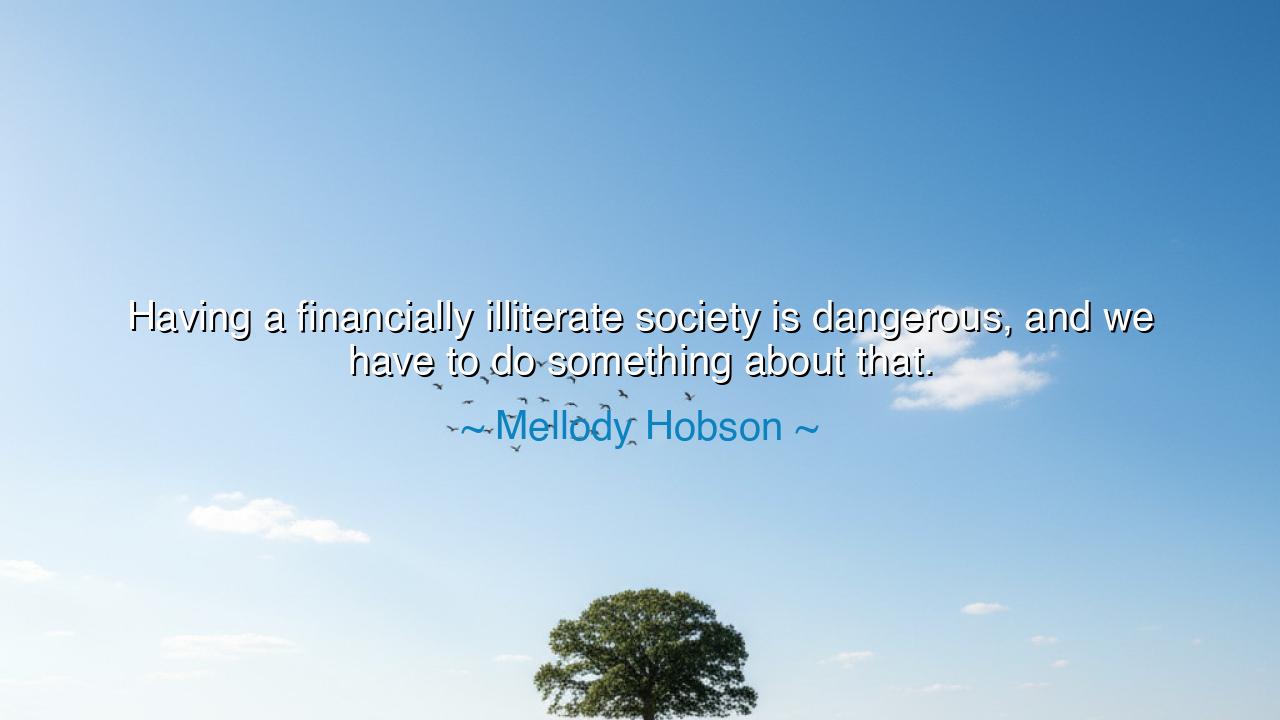
Having a financially illiterate society is dangerous, and we have
Having a financially illiterate society is dangerous, and we have to do something about that.






Hear, O children of wisdom, the words of Mellody Hobson, a guardian of knowledge in the realm of wealth and commerce: “Having a financially illiterate society is dangerous, and we have to do something about that.” These words shine like a warning fire upon the mountain, for they reveal a truth too often ignored: ignorance in matters of money is no small failing, but a peril that can bring ruin to families, nations, and civilizations.
For wealth is not only coins and bills; it is the fruit of labor, the foundation of homes, the sustenance of children, the pillar of society. When the people do not understand its use, its growth, or its risks, they become like sailors on a great sea without knowledge of stars or compass. At first the waters may be calm, but when storms come—and storms always come—they are dashed against rocks. To be financially illiterate is to be unprepared for the tempests of life, and Hobson declares rightly that such unpreparedness is dangerous.
Consider the tale of the Great Depression of the 1930s. Across the United States, people had borrowed recklessly, invested blindly, and trusted in wealth they did not understand. When the markets crashed, millions were thrown into despair, their savings vanished, their homes lost. Here was not only the failure of banks and governments, but also of education: the people had not been taught to manage, to plan, to discern. Entire societies trembled because their foundation rested not on wisdom but on ignorance.
History shows again and again that empires fall not only by sword, but by squandered treasure. The mighty Spanish crown of the sixteenth century, flooded with gold from the New World, spent and borrowed without wisdom, growing rich in appearance but hollow in truth. Inflation devoured its wealth, debts crippled its power, and soon the empire that had ruled seas could not even rule itself. This is the fate Hobson warns against: to be rich without understanding is more dangerous than to be poor with wisdom.
But let us also look to brighter examples. When postwar Japan rebuilt its nation, it taught its people not only to work, but to save, to invest, to understand the flow of wealth. Families became stewards of their earnings, companies nurtured long-term growth, and from the ashes of war rose one of the most prosperous economies of the modern age. Here, financial knowledge was not left to the few but shared among the many, and the society flourished.
The lesson, O listeners, is plain: we must not neglect the teaching of financial wisdom. Let children be taught early the meaning of money—not as an idol to be worshiped, but as a tool to be mastered. Let young men and women learn to save, to spend with discipline, to understand debt, to plan for the future. Let families speak openly of money, not in shame or secrecy, but in honesty and stewardship. For only a people who are financially literate can guard themselves against exploitation, poverty, and ruin.
Therefore, take these words into your lives: do not leave your understanding of wealth to chance. Read, learn, seek counsel, and practice discipline. And beyond your own household, labor to bring this wisdom into your community, so that no neighbor walks blindly into traps of debt or despair. For when the people are wise with money, they are strong in spirit, resilient in hardship, and free to pursue justice, peace, and prosperity.
Thus remember Mellody Hobson’s warning: “Having a financially illiterate society is dangerous.” Take it not as mere advice, but as a call to action. For in teaching ourselves and one another, we not only secure our own future, but we safeguard the strength of the society itself.






AAdministratorAdministrator
Welcome, honored guests. Please leave a comment, we will respond soon